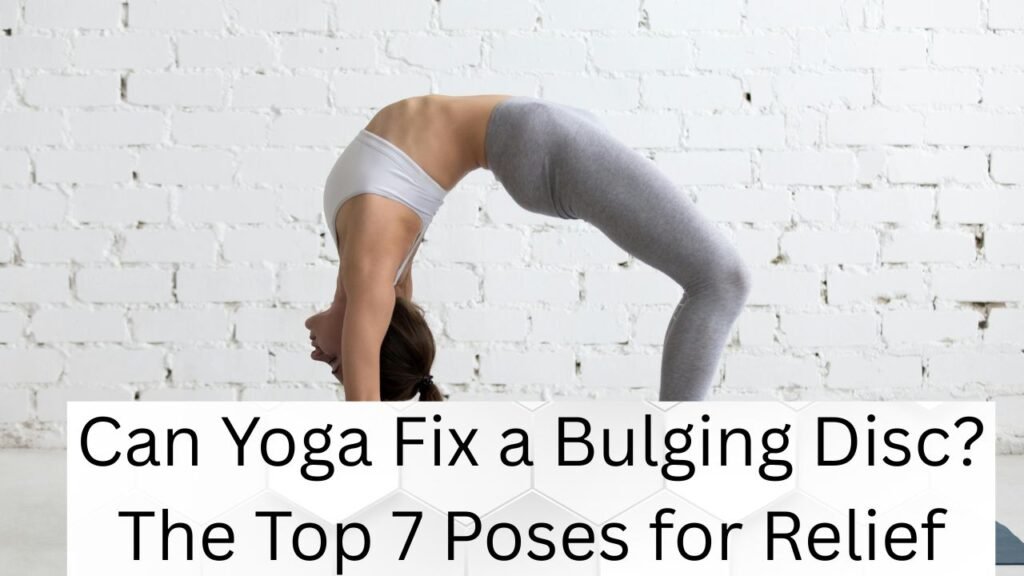A bulging disc can cause persistent back pain, stiffness, and discomfort. While severe cases may require medical intervention, yoga can be a highly effective tool for relief. Specific yoga poses help stretch and strengthen the spine, improve flexibility, and reduce pressure on the affected disc.

How Yoga Helps a Bulging Disc
Yoga promotes spinal health by decompressing the vertebrae, increasing circulation, and improving posture. When practiced correctly, it can:
- Reduce inflammation and pain
- Strengthen core and back muscles for better support
- Improve spinal alignment and mobility
- Relieve nerve compression
However, not all yoga poses are suitable for those with a bulging disc. Avoid deep forward bends and excessive twisting, as they can put more stress on the spine. Instead, focus on gentle, controlled movements that support healing.
The Top 7 Yoga Poses for Bulging Disc Relief
1. Cat-Cow Stretch (Marjaryasana-Bitilasana)
This dynamic movement gently mobilizes the spine, improves flexibility, and enhances circulation to the affected area.
How to Do It:
- Start on all fours with hands under shoulders and knees under hips.
- Inhale, arch your back, and lift your tailbone (Cow Pose).
- Exhale, round your spine and tuck your chin to your chest (Cat Pose).
- Repeat for 1-2 minutes in a slow, controlled manner.
2. Sphinx Pose (Salamba Bhujangasana)
This mild backbend helps strengthen the lower back without excessive compression.
How to Do It:
- Lie on your stomach with forearms on the ground, elbows under shoulders.
- Press your forearms into the mat and gently lift your upper body.
- Hold for 20-30 seconds while keeping your lower back relaxed.
- Repeat 2-3 times.
3. Child’s Pose (Balasana)
A deeply restorative pose that stretches the spine and relieves tension.
How to Do It:
- Kneel with your big toes touching and sit back on your heels.
- Extend your arms forward and lower your chest toward the floor.
- Hold for 30 seconds to a minute while breathing deeply.
4. Bridge Pose (Setu Bandhasana)
This pose strengthens the lower back and glutes while supporting spinal stability.
How to Do It:
- Lie on your back with knees bent and feet hip-width apart.
- Press your feet into the ground and lift your hips.
- Hold for 10-15 seconds, then slowly lower down.
- Repeat 3-5 times.
5. Supine Twist (Supta Matsyendrasana)
A gentle twist that helps release tension in the spine while promoting flexibility.
How to Do It:
- Lie on your back and bring your right knee toward your chest.
- Guide it across your body to the left while keeping your shoulders on the ground.
- Hold for 20-30 seconds, then switch sides.
6. Cobra Pose (Bhujangasana)
Strengthens the spine and promotes lumbar flexibility without excessive strain.
How to Do It:
- Lie on your stomach with hands under shoulders.
- Press into your palms and gently lift your chest.
- Hold for 15-20 seconds, then lower back down.
- Repeat 2-3 times.
7. Legs Up the Wall (Viparita Karani)
A restorative inversion that promotes blood circulation and spinal decompression.
How to Do It:
- Sit next to a wall and swing your legs up.
- Rest your lower back and hips against the floor.
- Hold for 3-5 minutes while focusing on deep breathing.
Tips for Practicing Yoga Safely
- Move slowly and avoid sudden jerky motions.
- Listen to your body—if a pose causes pain, stop immediately.
- Use props like cushions or yoga blocks for added support.
- Consult with a healthcare provider before starting any new exercise routine.
Conclusion
Yoga can be a powerful tool for relieving a bulging disc when practiced correctly. These seven poses focus on gentle stretching, strengthening, and decompression, helping to reduce pain and support long-term spinal health. By incorporating them into your daily routine, you can improve flexibility, posture, and overall back health naturally.